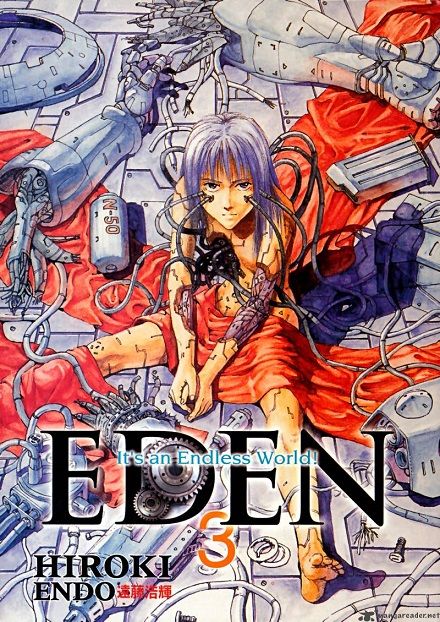
Eden: It’s an Endless World is one of the standout manga in my many years of experience with the medium. I’ve wanted to write about this series for years. It’s just taken me this long to digest its ideas, as you can see from the meandering summary I wrote a while back. The story is so big and its scope so grand that I’m daunted at the idea of ever reading the series again, but it’s also so compelling that I know I will revisit this manga someday.
Eden is a science fiction story about a world where the apocalypse didn’t happen, which is to say that it’s a science fiction story about our world.
In this cyberpunk future the Closure virus has ravaged humanity, killing two percent of the global population (which, let us be reminded, means the death of millions). The old order is dead, and the new order – the New World Order of the conspiracy theorists – has descended upon humanity in the form of the leviathan named Propater. Opposing Propater are an eclectic mix of drug lords, terrorists, and gangsters. Mostly they fight not out of ideological zeal but because they also want their cut.
The near-apocalypse of the setting invites millenarianism in its fictional universe, which the story covers extensively. In fact, the series draws heavily on Gnosticism, though not gratuitously and not gratingly. It’s possible to enjoy the manga without having any idea of the theological significance of aions, for instance.
The creator, Hiroki Endo, is an unrepentant leftist, and his politics suffuses every page. This is the only manga I know of which invites readers to check out Noam Chomsky in the appendix. The story is better for being overtly political. Otherwise it would be the type of reactionary fantasy that makes vague calls to fight for great justice while being so naive and so divorced from the everyday that it invites the opposite action. It’s heavily cyberpunk in that it’s a science fiction story distrustful of the establishment, but it also avoids the provincialism of much of cyberpunk. Be it New York, Los Angeles, or Neo-Tokyo, the classic cyberpunk stories are rooted in particular and specific urban geographies.
By contrast, this manga spans the globe, from brothels in Peru to private schools in Australia, with the story being the most compelling when it deals with the dispossessed. The manga even touches upon what the Zapatistas call the Fourth World, or the indigenous peoples so far out of the orbit of the powerful that they don’t fit into the totalizing categories of First and Third World.
As well, Endo is fascinated by the interface between humanity and its technology, personified in the form of the cyborg. He’s fond of images like the one above, where the hard and mechanical is revealed underneath the feminine and organic.
As you may guess, the subject matter guarantees that this manga is full of violence, but of the more grounded type. This is an example of the seinen genre, which is targeted at men. I guess it might be characterized as a thriller in the vein of a more leftist Spartan or Ronin.
This is not a story for everyone, but at times it felt like it was made for me. Perhaps I misspoke when I said that I’ve taken years to digest the ideas in this story, for I’m still grappling with them. Too many action stories and too many manga retreat into fantasies of empowerment and away from actual political engagement. It’s refreshing to read one that faces the political head on.